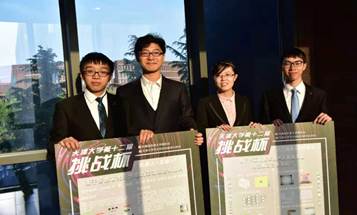TJU Team Wins Third Prize in 16th National Challenge Cup
Tianjin University’s team won a third prize in the 16th National Challenge Cup Final recently held at Beihang University for their work--Research on Arbitrary Path Planning of Acoustic Particle Manipulation Based on AI, also referred to as Acoustic Manipulation. The team has applied for a national patent with the title of “A Neural Network Based Ultrasonic Suspension 3D Manipulation Control Method and System”.

All seven team members are undergraduate students from the School of Science, including Huo Jierong, Zhuang Xu, Bai Yiming, He Lidan, Lu Shengyue, Li Renyun, and Wang Wei, under the guidance of their teachers Dai Haitao and Pang Hai.
Acoustic manipulation (Acoustic Tweezers) is a technology that has gradually emerged in recent years. The non-uniform sound pressure field is formed by mutual interference between ultrasonic waves, and tiny objects can be stably suspended at the sound pressure nodes.
Most of the current progress has made the suspended solids bound to the sound well with high stability and precise manipulation, but all of them have certain limitations because they use the top-down design idea to achieve the purpose of manipulation. It cannot meet the requirements of the change of the corresponding phase distribution caused by the real-time change of the steering track in the production activity.
Acoustic manipulationprovides a neural network-based ultrasonic suspension 3D manipulation control method and a system capable of manipulating trajectory real-time changes. It improves the practical value of ultrasonic manipulation and avoids the one-to-one specific modeling and calculation process by directly knowing the phase distribution of oscillator through AI neural network calculation. It also develops an ultrasonic suspension 3D operation control system to realize 3D movement of the particles along a specific path in three directions.
The national Challenge Cup is known as Chinese College undergraduate students’ “Olympic Science Competition”. More than 2,000,000 students from 2000 higher education institutes nationwide attended the competition involving eleven academic fields such as mechanics and control, information technology, biological science, economics, philosophy, society, education, management, etc. The judging committee includes 100 experts and academicians.
By the School of Science
Editors: Eva Yin & Doris Harrington

